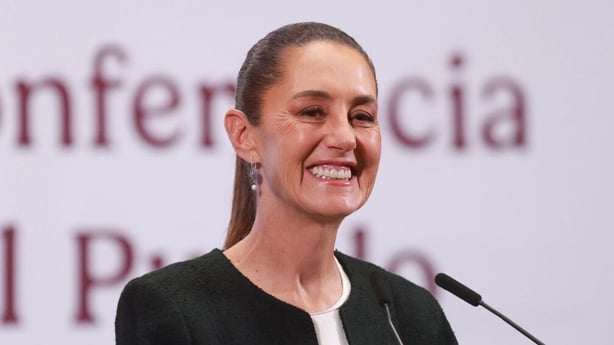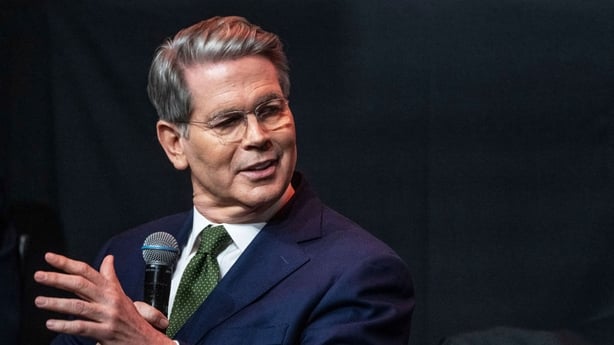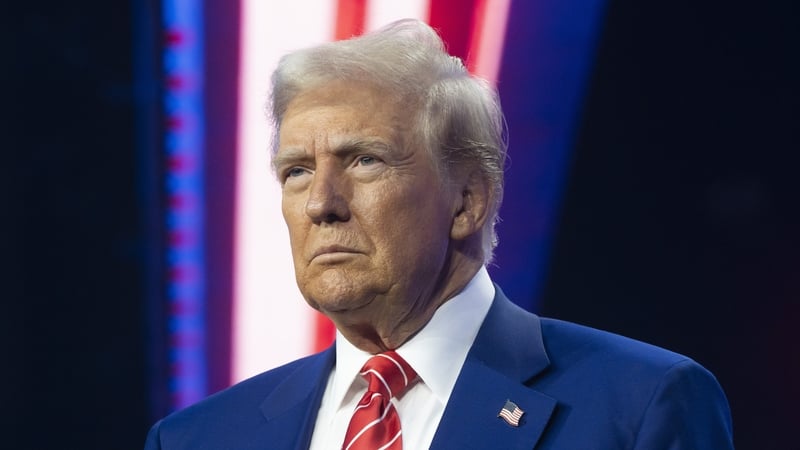US President Donald Trump has unveiled a temporary rollback to steep tariffs targeting Canada and Mexico, providing some reprieve to companies and consumers after sustained blowback on global markets.
After his sweeping tariffs of up to 25% on the two US neighbors took effect on Tuesday, stock markets tumbled, as economists warned that blanket tariffs could weigh on US economic growth and raise inflation in the near-term.
Though the Republican president dismissed suggestions that his trade decisions were linked to market turmoil, he decided to pause the levies for trade with Canada and Mexico that falls under a regional pact.
The exemption, which will expire on 2 April, covers both of the two largest US trading partners.
Mr Trump had earlier only mentioned an exemption for Mexico, but the amendment he signed covers Canada as well.
For Canada, the amended order also excludes duties on potash, a critical fertiliser for US farmers, but does not fully cover energy products, on which Mr Trump has imposed a separate 10% levy.
A White House official said that is because not all energy products imported from Canada are covered under the US-Mexico-Canada Agreement on trade that Mr Trump negotiated in his first term as president.
Mr Trump imposed the tariffs after declaring a national emergency due to deaths from fentanyl overdoses, asserting that the deadly opioid and its precursor chemicals make their way from China to the US via Canada and Mexico.
Mr Trump has also imposed tariffs of 20% on all imports from China as a result.
The exemptions will expire early next month, when Mr Trump has threatened to impose a global regime of reciprocal tariffs on all US trading partners.
The development comes a day after Mr Trump exempted automotive goods from the 25% tariffs he imposed on imports from Canada and Mexico as of Tuesday, levies that economists saw as threatening to stoke inflation and stall growth across all three economies.

US stock markets resumed their recent sell-off today, with investors citing the rapid-fire, back-and-forth developments on tariffs as a concern due to the uncertainty they are fanning.
Economists have warned that the levies may rekindle inflation that has already proven difficult to bring fully to heel, and slow demand and growth in its wake.
The US president said after a phone call with Mexican President Claudia Sheinbaum that fresh tariffs targeting Mexico would not apply to trade that falls under an existing regional pact between the United States, Mexico and Canada.
The pause, he said, was “until 2 April”. At that point, Canadian and Mexican goods could still face reciprocal levies.
“I did this as an accommodation, and out of respect for, President Sheinbaum. Our relationship has been a very good one,” Mr Trump said on his Truth Social platform.
Ms Sheinbaum hailed “unprecedented results” from collaboration with the US.
“We will continue to work together, particularly on migration and security issues,” Ms Sheinbaum wrote on social media after what she called an “excellent and respectful” phone call with Mr Trump.
Earlier, Canadian Prime Minister Justin Trudeau said that Canada will remain in a trade war with the US for “the foreseeable future” even if there are “breaks for certain sectors”.
“Our goal remains to get these tariffs, all tariffs removed,” Mr Trudeau added.
Global markets tumbled after Mr Trump’s announcement of 25% tariffs on US imports from Canada and Mexico took effect Tuesday and economists say Americans are likely to face broad-based price rises.
Since taking office in January, Mr Trump has made a series of tariff threats on allies and adversaries alike, declaring trade wars will be a key part of his foreign policy.
Mr Trump justified the tariffs on the United States’ two giant neighbours and vital trade partners, along with China, as a way to stop illegal immigration and trafficking of the deadly drug fentanyl.
However, Canada contributes less than one percent of fentanyl to the United States’ illicit supply, according to Canadian and US government data. It is also a relatively minor source of illegal immigration, compared to flows across the Mexican border.

China, meanwhile, has pushed back on US allegations of its role in the fentanyl supply chain, calling this a domestic issue that tariffs will not resolve.
US Treasury Secretary Scott Bessent said that he was not concerned Mr Trump’s tariffs would be inflationary, adding that any impact on prices would likely be temporary.
Economists warn that blanket tariffs stand to weigh on US economic growth and raise inflation in the near-term.
Mr Trump has referred to tariffs as a source of US government revenue, and a way to remedy trade imbalances and practices Washington deems unfair.
The US trade deficit surged to a new record in January according to government data today, as imports spiked while tariff worries flared in the month of Mr Trump’s inauguration.
The overall trade gap of the world’s biggest economy ballooned 34% to $131.4bn, on the back of a 10% jump in imports for the month, said the Commerce Department.
Analysts say the US deficit was likely bolstered by gold imports.
But “stripping out this impact, all other imports rose 5.5 percent, indicating front-loading of shipments was in full swing,” said Oxford Economics senior economist Matthew Martin.
This refers to a tendency for businesses to try and get ahead of additional costs from potential tariffs, and possible supply chain disruptions.




